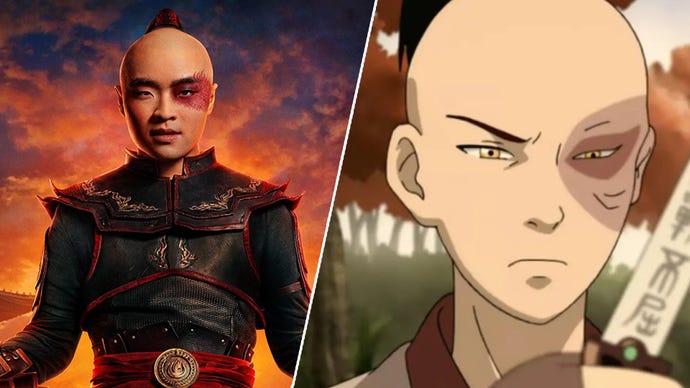The best change Netflix's Avatar: The Last Airbender made from the original shows how good it could have been
Wasted potential.
Netflix's live action take on Avatar: The Last Airbender made quite a few changes from the original animated series. For the most part, I'm really not a big fan of them - I think a lot of them time they just feel like changes for the sake of them, others are clearly because the length of episodes and the season's structure is different. There's one in particular, about Zuko, that I actually quite like, and think is better than what happens in the original show. Most frustrating of all, it's the kind of decision that shows exactly what the show could have been.
Spoilers ahead for both the original and Netflix versions of Avatar: The Last Airbender.
The change I'm talking about comes from episode six of the live action show, which adapts specifically Zuko's backstory, originally revealed in episode 12 of the animated series. Both episodes explore just how Zuko got his scar, and is essentially the first big moment where you're meant to feel sorry for the banished prince.
In both versions, Zuko is part of a war meeting with his father and the Fire Nation's army generals. He's meant to be just sitting in, not really contributing, but when one general suggests they should send off the 41st division to die all to benefit the war efforts (ahem, colonisation efforts) elsewhere, and Zuko decries the idea, questioning how they could possibly sacrifice their own people. It's a great moment, showing you how Zuko isn't really fit for the life he was born into, and up to this point he's never really been shown to be compassionate.
For the animated original, this backstory is regaled to his ship's crew by Iroh, his uncle doing so because he wants the crew to understand that Zuko isn't all bad. The live action does the same, except the big reveal is that the ship's crew themselves are the very same 41st battalion, a change that ties the story in the past to the story in the future really nicely. I really don't hate this change! But to be perfectly honest, it's the only good one the show makes, and it being such a good change highlights even further that it just can't match the original.
I think one of the most aggravating, negative changes the Netflix show makes is to do with one of the last episodes in the first season of the animated series, where the Gaang visits the Northern Air Temple. There, they find that a group of people have made a home out of it, partially destroying the temple, upsetting Aang in the process - this is his history, after all, and he's the only air bender left. This whole plot line is just condensed into an episode with the Gaang's visit to Omashu, two completely separate events, because… well, I don't know why! It doesn't add to the Omashu storyline in any way, and you lose the journey Aang goes through to learn that change is ok, particularly in a time of war.
Then there's the fact that Aang doesn't learn a lick of waterbending in the first season of the live action show, which will absolutely come back to bite the writer's in the ass when they have to balance both that and earth bending in season 2. That's on top of small bits of smart setup, like Iroh being able to redirect lightning, later using this technique when fighting Zuko's sister, a tiny moment you wouldn't think of half the time but just fleshes out the story so much more, and is completely absent in the live action.
Perhaps worst of all is the fact that none of these characters really have flaws anymore. There's conflict, but only between the good guys and the bad guys, but the animated show understood that its protagonists were children, and like how real kids do, sometimes they argued over silly things. Aang is just the perfect destiny child in Netflix's version, willing to do his duty to save the world, never distracted, always committed - the complete opposite to how he is meant to be.
When I look at all these changes, I just wonder how they managed to find such a good one such as the 41st battalion one. I guess if you throw enough s**t at a wall something will stick, right? It does highlight the potential of a modern adaptation though - even if I think there's few things that can justify being remade - and how you could build upon already strong foundations.
Avatar is beloved for a lot of reasons, but it wouldn't be nearly as fondly remembered if it wasn't for just how well constructed a show it was. The original team knew what they wanted to do over the course of three seasons, and built it up in such a clever way that you as an audience member would feel smart for putting the pieces together early. Not to mention the only great and economic use of animation, something the live action show doesn't even understand.
I'm still of the opinion that, even if it had been good, we didn't and don't need this remake, but it's no excuse for how the show did turn out. The greatest crime the show makes is failing to live up to its potential, and forces it to plummet further than it needed to. That, and Appa is barely in it, so why even bother?

.jpg?width=70&height=70&fit=crop&quality=60&format=png&auto=webp)